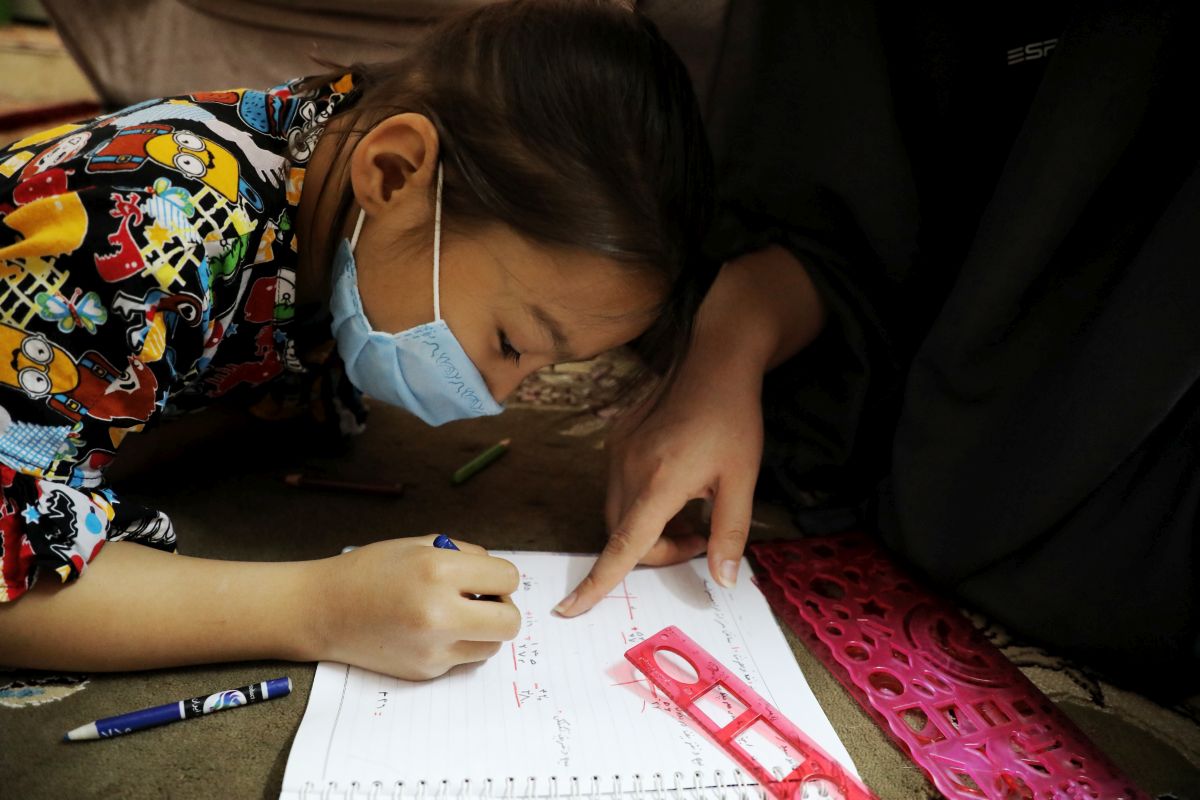
An Afghan refugee girl is practicing math while wearing a mask. ; During the COVID19 times in Iran, Afghan refugees showed a great resilience and managed to follow their daily routines and works despite the hardships imposed on them due to the pandemic and economic situation.
© UNHCR Sebastian Castañeda
UNHCR, the UN Refugee Agency, is calling for an international effort to guarantee secondary education for refugee children and youth, as levels of school and university enrolment remain critically low.
The call comes as UNHCR launches its 2021 Education Report, Staying The Course: The Challenges Facing Refugee Education. The report highlights the stories of young refugees around the world as they try to keep learning in an era of unprecedented disruption caused by the COVID-19 pandemic.
Secondary school should be a time of growth, development and opportunity. It increases the job prospects, health, independence and leadership of vulnerable young people, and they are less likely to be pressured into child labour.
Yet according to data gathered by UNHCR in 40 countries, the gross enrolment rate for refugees at secondary level in 2019-2020 stood at only 34 per cent. In almost every country, the rate trails that of host community children.
The pandemic is likely to have undermined refugees’ chances yet further. COVID-19 has been disruptive for all children, but for young refugees – already facing significant obstacles to getting into school – it could dash all hopes of getting the education they need.

“Recent progress made in school enrolment of refugee children and youth is now under threat,” said UNHCR chief Filippo Grandi. “Confronting this challenge requires a massive, coordinated effort, and it is a task we cannot afford to shirk.”
UNHCR is calling on states to guarantee the right of all children, including refugees, to access secondary education, and to ensure they are part of national educational systems and planning.
In addition, states hosting large numbers of displaced people need assistance in building capacity: more schools, appropriate learning materials, teacher training for specialised subjects, support and facilities for teenage girls, and investment in technology and connectivity to close the digital divide.
The data also shows that from March 2019 to March 2020, gross enrolment rates for refugees at primary level stood at 68 per cent.
Enrolment in higher education was at 5 per cent, a 2-point rise year on year and a gain that represents transformational change for thousands of refugees and their communities. It’s an increase that also offers hope and encouragement to younger refugees facing daunting challenges to accessing an education.
Yet this level remains low when compared to global figures, and without a major increase in access at secondary level, the 15by30 target set by UNHCR and partners – 15 per cent of refugees enrolled in higher education by 2030 – will remain out of reach.
Serbia is committed to inclusion of refugees into education
„Refugee children in Serbia have access to all levels of education since early 2016. The majority attends primary schools, while a lower number attends secondary education. UNHCR is very pleased that this year marks a breakthrough for tertiary education with the access to university for four refugees – two boys from Afghanistan, girl from Burundi and boy from Libya”, said Francesca Bonelli, UNHCR Representative in Serbia.
According to the official data, in our country currently about 175 refugees are included in the educational system. UNHCR, together with partner organisations, actively follows and supports the education of more than 20 young refugees that attend secondary schools, 140 of them in primary schools. When it comes to higher education, this year, for the first time, the enrolment of refugees who are not from the region at the public faculties in Belgrade was recorded.
“We will continue to promote refugees and asylum-seekers enrolment in tertiary education and join efforts with the Government to progress in this area. This will enable many big steps and solutions in lives of those who were forced to flee”, concluded Francesca Bonelli.
Government of Serbia has highlighted the inclusion of children and youth from the refugee population in higher education as one of its pledges at the 2019 Global Refugee Forum.
***
For more on UNHCR’s work in the field of education, please visit the website
„Becoming who we are: stories on refugee education”.
For more on mixed migration flows, please visit UNHCR Data Portal.
For all additional information, please contact Dušan Lopušina, UNHCR Serbia, at lopusina@unhcr.org.
Share on Facebook Share on Twitter